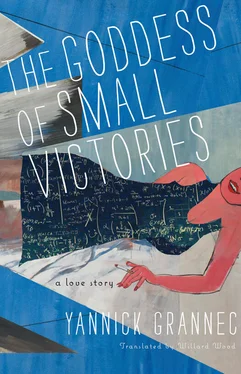Anna lifted her arms, which had grown numb, to scratch her head. She could feel how tangled her loosened hair had become. Adele rummaged in her bedside stand and pulled out a hairbrush.
“Don’t worry, it’s clean. I never use it.”
The firm strokes of the stiff-bristled brush were delicious; Anna started to relax. She had no memory of her mother ever combing her hair, but she suddenly remembered Ernestine, the Adamses’ nanny, patiently tying her braids. A pang of guilt. She hadn’t contacted Ernestine in a very long time, though she lived only a short distance away.
“You have such beautiful hair. What a shame to twist it into a bun like an old maid! You’re quite pretty, really, but you don’t present yourself well.”
Anna stiffened. “I don’t care about being pretty. I’ve never had a problem attracting men. What worries me is that I’m not doing anything with my life.”
“You’ve given up being attractive? But why, in God’s name?”
“Haven’t you given anything up?”
A hard brush stroke made Anna grimace.
“ Mein Gott! You won’t come clean unless we use forceps! I feel your brain wandering, looking for the emergency exit.”
She concentrated on a particularly stubborn knot. The young woman resigned herself to the pain. Adele could never understand her. She belonged to a different generation. Having to be alluring was an archaism, and she, Anna, refused to submit to it. She had never shared her friends’ interest in window shopping or their hysterics before a party. She saw it as a revival of the Stone Age division of the sexes: the hunter-boys chase balls, and the gatherer-girls peel coat hangers. Her theory had made Leo laugh. He believed that Anna despised the dance of the sexes only because she didn’t have the courage to own her tiny breasts. Hiding away in nuns’ clothes revealed her entirely predictable fear of the phallus and her outsized ego. He congratulated her on her lack of sartorial effort since in any case he preferred her naked. She thanked her two-bit shrink for his analysis by throwing a dictionary at his head, proving that her reptilian brain had not altogether renounced being primal.
Even the men she unwittingly attracted tried to smother her from the very first night. The curse of the Madonna. She was perfectly aware of her power. She had no interest in extending it.
“I’m a very boring person,” said Anna.
“If you were, I wouldn’t waste my time on you. What else? Say it without thinking.”
“I used to like to write.”
The brush slowed imperceptibly.
“It never to came to anything. One day my mother read one of my notebooks. She laughed.”
“Families have an unlimited genius for destruction.”
“Thank you, Doctor. I would never have guessed on my own.”
Adele caressed her cheek; the young woman felt a sudden flood of emotion, far beyond compassion.
“My husband taught me this. Life confirmed it. A system cannot understand itself. Self-analysis is very difficult. You can only see yourself through others’ eyes.”
“Submit to the judgment of others? That doesn’t sound like you.”
“Indirect lighting is sometimes stronger. I may not be the person to turn on the lightbulb for you, but I am getting to know you. You’re a person who feels empathy, you’re observant, and you like words.”
“Nothing to build a career around.”
“I’m talking to you about pleasure. Find where your happiness is, Anna!”
“And where is yours, Adele?”
The old woman tossed the brush on the bed.
“Mine is currycombing. I’m stopping for today, sweet pea. My arms ache!”
28. 1944: An Atomic Soufflé
Some recent work by E. Fermi and L. Szilard, which has been communicated to me in manuscript, leads me to expect that the element uranium may be turned into a new and important source of energy in the immediate future. Certain aspects of the situation which has arisen seem to call for watchfulness and, if necessary, quick action on the part of the administration … This new phenomenon would also lead to the construction of bombs …
— Albert Einstein, letter to President Franklin D. Roosevelt, August 2, 1939
“He’s still out there.”
“They’ll be arriving at any moment, Kurt. Turn the lights back on! I have to set the table.”
“See for yourself!”
Irritated, I made my way to the side of the window, where he was hiding.
“Be more discreet, Adele. He’ll see you.”
I examined the quiet thoroughfare. A dank November gloom had settled over Alexander Street. I saw a single figure strolling by: a man lost in his thoughts.
“I saw that man on the way to the Institute this morning. I recognize his hat.”
“Princeton is such a small town, Kurt. It’s perfectly normal to see the same people more than once.”
“He’s following me!”
“Shut the damned windows! It’s freezing in here. Your guests will all be shivering.”
He had bundled himself up in a thick woolen jacket, knitted by my own hands.
“The apartment has a funny smell.”
“Now don’t start! I aired it out all day. I burned sprigs of sage. Every room has been thoroughly scrubbed. I can’t do any more.”
“I can still smell the previous renters.”
“You’re too sensitive. Do something useful for once. Put out the plates and shut the windows!”
I went back into the kitchen, shivering despite the heat from the oven. I lived my days with the windows open and my arms in the washing machine. Kurt had always been pathologically sensitive to smells, including those of the body. Since moving to Princeton, his reactions had become obsessive. I had to bathe scrupulously before joining him in bed. Sweat, strong perfume, or my morning breath disgusted him. He avoided me like the plague when I had my period. Of course, he never talked about it. How could he even touch on the subject? Yet I had to listen to a daily description of the changes in his body temperature and the consistency of his stools. My own internal machinery didn’t interest him. Every morning, I would sort through the wash, sniffing his clothes one by one, not so much for any trace of female contact as to inhale his smell in his absence. But he didn’t sweat. His skin had very little odor and his clothes didn’t get dirty.
When I returned to the living room, he was still peering out into the street.
“Damn it to hell, Kurt! Set the table!”
“Don’t swear like that, Adele. And don’t get so agitated. This is not a formal dinner.”
I stuck my tongue out at his back. I set the table and looked at it critically: no silver, no fine porcelain. The secondhand bride had not merited an elaborate trousseau.
He stayed planted by the window.
“Where are they? Did you tell them six o’clock?”
“They had to bring Russell to the station first.”
“I’m wondering when I should put the soufflé in the oven.”
“You should have planned a simpler menu.”
“Albert Einstein is coming to dinner! Of course I’m going the whole nine yards!”
“His tastes are down-to-earth.”
“He won’t be disappointed, given how primitive the apartment is.”
“Don’t always complain, Adele. We’re a hop and a jump from the shuttle. They’ll be here in a few minutes.”
“You and your mania for train stations. If they call the shuttle the ‘Dinky,’ it’s because it really deserves the name. What a flea bucket! In any case, we never go to New York.”
“You’re free to go without me.”
“And spend what money? Everything has started to get more expensive. I’m juggling every day just to make ends meet.”
He put his hand over his stomach. I swallowed my resentment. I wanted this dinner to succeed.
Читать дальше












